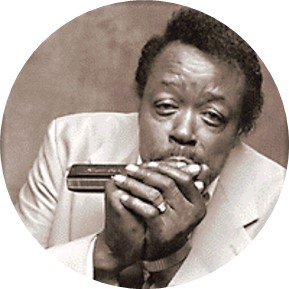
Carey Bell, Harrington took his place in the lineage of Chicago blues harp masters in the 1970s, exuberantly following in the footsteps of his mentors Big Walter Horton and Little Walter Jacobs. In addition to recording noteworthy albums of his own, he became Chicago’s go-to harmonica player for blues sessions, valued for his creative solo flights and the ease with which he adapted to any song put before him. Bell made is first studio recordings backing guitar virtuoso Earl Hooker in November 1968 and over the next three decades he played on more than 100 different sessions, either as the featured artist or backing Willie Dixon, Muddy Waters, Louisiana Red, Jimmy Rogers, Eddy Clearwater and many others. He duetted on some with Big Walter Horton and other harp masters and joined James Cotton, Junior Wells and Billy Branch for a historic Harp Attack! album on Alligator. His good-natured, often playful live performances could generate even more excitement when he had the chance to extend his melodic explorations on both on the 10-hole diatonic harmonica and the larger chromatic instrument.
Born Cary (sic) Harrington in Macon, Mississippi, on November 14, 1936, he began playing harmonica as a child and by the time he was in his teens he had come under the wing of veteran pianist Lovie Lee in the nearby city of Meridian. Lee took a young band including his “adopted stepson” Bell to Chicago in the mid-1950s and over the years they wove their talents into the Windy City blues fabric while holding down other jobs to make a living. Guitarist Honeyboy Edwards also guided the young Bell, playing with him and introducing him to both Little Walter and Big Walter. Edwards also showed Bell some runs on the bass, an instrument Bell learned to play with expertise. Bell also worked with Johnny Young, Eddie Taylor, ad others and was recorded in a street performance with Robert Nighthawk at the Maxwell Street market in 1964. Earl Hooker hired Bell for a tour to play bass, and then harmonica when he learned how well Bell could play. After his recording session with Hooker for Arhoolie, Bell played on a Sleepy John Estes session for Delmark and waxed his own Delmark debut LP, Carey Bell’s Blues Harp, in 1969.
His career immediately shifted into high gear with regular club gigs, festivals and tours, including several junkets to Europe. Muddy Waters brought Bell into his band, as did Howlin’ Wolf briefly, followed by a stint with Willie Dixon’s Chicago Blues All Stars, in between his own gigs and sessions. Albums of his work, some co-billed with his son Lurrie Bell, a phenom himself, appeared on ABC BluesWay, Alligator, Blind Pig, Wolf, Rooster Blues, L+R, Blues South West, JSP and other labels in the U.S. and several other countries. His Alligator CD Good Luck Man won a W.C. Handy Award in 1998, the same year he was elected Traditional Male Blues Artist of the Year, following several previous nominations.
Among his other accomplishments he sired a brood of blues-playing sons including Lurrie, Steve (now playing harp in classic Carey Bell style in John Primer’s band), Tyson and James. He had moved to North Carolina and lived with Willie Dixon’s daughter Patricia before entering a Chicago hospital where he died of pneumonia and renal failure on May 6, 2007. A diabetic, Bell had suffered a stroke in 2006 but the joy of making music never left him and he recorded tracks for his final CD onstage in a wheelchair.
Inducted in 2023 The Blues Foundation’s Hall of Fame
-Jim O’Neal, BluEstorica.com
